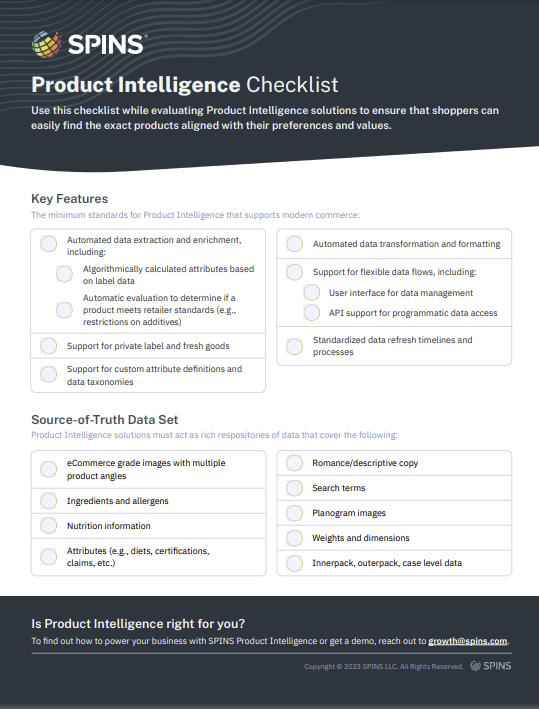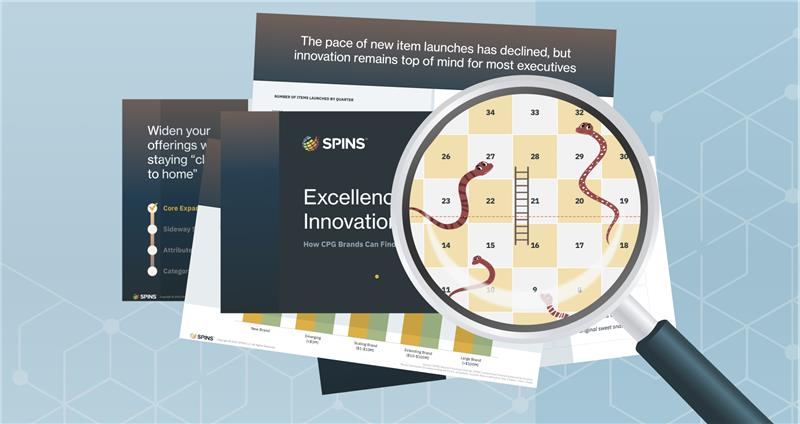Introduction
At its most basic, Product Intelligence is just logically organizing products to make it easy for shoppers to find what they’re looking for, e.g., organizing an assortment into aisles by category. However, as shoppers continue to make purchase decisions based on their values, basic categorization isn’t enough anymore. Shoppers aren’t looking for white or wheat, they’re looking for 7-grain, non-GMO, and high-protein, vegan loaves.
Managing the ins and outs of product attributes and how they align with shopper values can be a complex undertaking—especially with so many new products entering the market each year. It gets even more confusing when you realize that of the nearly 62,000 products introduced last year in 2022, approximately 23,000, or 37%, of them were focused on health & and wellness. In other words, all those products had at least one wellness-focused attribute that help them stand out to a values-oriented shopper. And that’s without counting retailer private label products.
What Retailers Need from a Product Intelligence Solution
As products get more complex, the solutions and data necessary to manage them must also evolve. However, how does a retailer choose the right solution?
Kevin Miller, chief marketing officer of The Fresh Market, evaluates new technology partnerships through three questions:
- Will it boost the reach to our core customers as well as new ones?
- Will it increase our relevance to our target audience?
- Will it increase our revenue?
Good Product Intelligence should be able to achieve all three for retailers, after all, Product Intelligence isn’t just about selling more products (though it certainly helps!), but it’s also about streamlining a retailer’s overall operations. To accomplish this, it’s important to keep in mind that Product Intelligence solutions shouldn’t be evaluated in the vacuum of a single department’s use cases.
Key Product Intelligence Features for Retailers
There are a lot of Product Intelligence providers out there and not everyone needs a rocket ship to get from A to B. Here are a few features of strong Product Intelligence solutions that retailers should pay close attention to:
- Complete product support—including private label and fresh: Many Product Intelligence providers fall short on support for private label and fresh goods, however, this either creates a significant gap in visibility for shoppers or a costly new workflow for retailers to maintain. Neither scenario should be acceptable.
- Support for custom attributes: This is how a retailer reflects their unique values to their shoppers. Some of the most successful retailers focus on a specific market segment, and being able to define and ensure consistency in product attribution (e.g., custom diet/nutrition definitions) brings those values to life where those attributes are reflected.
- Designated data verification schedule: Products get updated all the time, and stale data can be a risk, for example, if a product gets reformulated and allergen information changes. If data doesn’t have a designated refresh/verification timeline, e.g., every 9 months, it can’t be treated as a source of truth.
- Automated data extraction and transformation: Time is money—the quicker data can be extracted and updated on shopper touch points, the higher the odds they’ll be able to act on that information. In other words, automated workflows are required to scale retailer operations and maximize shopper discoverability.
As you continue to evaluate a Product Intelligence solution that fits your needs, make sure it meets the minimum standards necessary for a modern solution with our PI Checklist:






